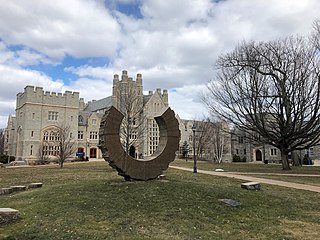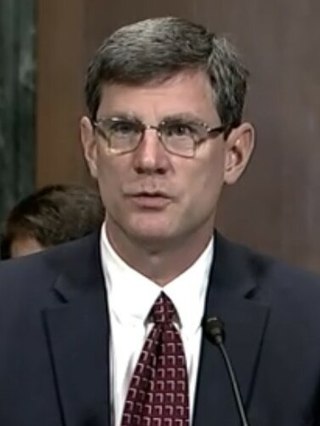
A judge is a person who presides over court proceedings, either alone or as a part of a panel of judges. A judge hears all the witnesses and any other evidence presented by the barristers or solicitors of the case, assesses the credibility and arguments of the parties, and then issues a ruling in the case based on their interpretation of the law and their own personal judgment. A judge is expected to conduct the trial impartially and, typically, in an open court.
In law, an en banc session is a session in which a case is heard before all the judges of a court rather than by one judge or a smaller panel of judges.

The United States Court of Appeals for the Second Circuit is one of the thirteen United States Courts of Appeals. Its territory comprises the states of Connecticut, New York and Vermont. The court has appellate jurisdiction over the district courts in the following districts:

The Harvard Law Review is a law review published by an independent student group at Harvard Law School. According to the Journal Citation Reports, the Harvard Law Review's 2015 impact factor of 4.979 placed the journal first out of 143 journals in the category "Law". It is published monthly from November through June, with the November issue dedicated to covering the previous year's term of the Supreme Court of the United States. The journal also publishes the online-only Harvard Law Review Forum, a rolling journal of scholarly responses to the main journal's content. The law review is one of three honors societies at the law school, along with the Harvard Legal Aid Bureau and the Board of Student Advisors. Students who are selected for more than one of these three organizations may only join one.

The Michigan State University College of Law is the law school of Michigan State University, a public research university in East Lansing, Michigan. Established in 1891 as the Detroit College of Law, it was the first law school in the Detroit, Michigan area and the second in the state of Michigan. In October 2018, the college began a process to fully integrate into Michigan State University, changing from a private to a public law school. The integration with Michigan State University was finalized on August 17, 2020.

The University of Connecticut School of Law is the law school associated with the University of Connecticut and located in Hartford, Connecticut. It is the only public law school in Connecticut and one of only four in New England. In 2020 it enrolled 488 JD students.

Thomas Joseph Meskill Jr. was a longtime United States circuit judge of the United States Court of Appeals for the Second Circuit. He previously served as the 82nd governor of Connecticut, as a United States representative from Connecticut, and as the mayor of New Britain, Connecticut. He is noted as having served in all three branches of government and at the local, state and federal levels of government during his career of public service.

Jay Scott Bybee is an American lawyer and jurist serving as a senior U.S. circuit judge of the Court of Appeals for the Ninth Circuit. He has published numerous articles in law journals and has taught as a senior fellow in constitutional law at William S. Boyd School of Law. His primary research interests are in constitutional and administrative law.
The University of Illinois College of Law is the law school of the University of Illinois Urbana-Champaign, a public university in Champaign, Illinois. It was established in 1897 and offers the J.D., LL.M., and J.S.D. degrees.

Connecticut v. Doehr, 501 U.S. 1 (1991), was a United States Supreme Court case in which the Court held that a state statute authorizing prejudgment attachment of a defendant's real property upon the filing of an action without prior notice or hearing, a showing of extraordinary circumstances, or a requirement that the plaintiff post a bond violates the Due Process Clause of the Fourteenth Amendment.

The William & Mary Law School, formally known as the Marshall-Wythe School of Law, is the law school of the College of William & Mary, a public research university in Williamsburg, Virginia. It is the oldest extant law school in the United States, having been founded in 1779 at the urging of alumnus Thomas Jefferson. It has an enrollment of 606 full-time students seeking a Juris Doctor (J.D.) or a Master of Laws (LL.M.) in the American Legal System, a two or three semester program for lawyers trained outside the United States.

Christopher Fitzgerald Droney is a former United States circuit judge of the United States Court of Appeals for the Second Circuit and former judge of the United States District Court for the District of Connecticut.
The South Carolina Law Review is a student-edited law review that was established in 1937. It covers South Carolina law and commentary on the United States Court of Appeals for the Fourth Circuit. It also publishes the winning essays from the Warren E. Burger Writing Competition, which is sponsored by the American Inns of Court Foundation. In 2008 the journal began to experiment with peer review.

Duke University School of Law is the law school of Duke University, a private research university in Durham, North Carolina. One of Duke's 10 schools and colleges, the School of Law is a constituent academic unit that began in 1868 as the Trinity College School of Law. In 1924, following the renaming of Trinity College to Duke University, the school was renamed Duke University School of Law.
Day Pitney LLP is a U.S. law firm with more than 300 attorneys spread across thirteen offices in six states and the District of Columbia. In 2011, Day Pitney ranked 139th on The National Law Journal's list of the 250 largest American law firms.

In United States constitutional law, the penumbra includes a group of rights derived, by implication, from other rights explicitly protected in the Bill of Rights. These rights have been identified through a process of "reasoning-by-interpolation", where specific principles are recognized from "general idea[s]" that are explicitly expressed in other constitutional provisions. Although researchers have traced the origin of the term to the nineteenth century, the term first gained significant popular attention in 1965, when Justice William O. Douglas's majority opinion in Griswold v. Connecticut identified a right to privacy in the penumbra of the constitution.

Joan Louise Larsen is an American attorney serving as a United States circuit judge of the United States Court of Appeals for the Sixth Circuit. She previously was an associate justice of the Michigan Supreme Court from 2015 to 2017.

William Joseph Nardini is an American lawyer who serves as a United States circuit judge of the United States Court of Appeals for the Second Circuit.
McDonough v. Smith, 588 U.S. ___ (2019), was a United States Supreme Court case from the October 2018 term. In a 6–3 ruling, the Court held that the 3-year statute of limitations for a fabrication of evidence civil lawsuit under section 1983 of the Civil Rights Act begins to run when the criminal case ends in the plaintiff's favor.













